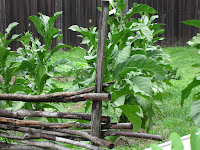Who is John Rolfe? Why was he important to Jamestown? Was it
because he married Pocahontas?
 |
| John Rolfe as many believed he looked |
That was partly the reason, but mostly he is credited with
the production of tobacco in the colonies. The tobacco he produced was much
sweeter and more fragrant than the type the Native Americans grew. This tobacco proved to be so popular it
challenged the Spanish monopoly on tobacco.
 |
| Tobacco - the cash crop that saved Jamestown |
Rolfe was born in Norfolk, England in 1585. His parents were
John and Dorothea. His exact birthdate
is unknown, but he was baptized on May 6, 1585.
John Rolfe arrived in Jamestown from the ship Sea
Venture. The Sea Venture was actually
the flagship for a nine ship convoy headed for the colonies. It stopped in the Caribbean where John Rolfe
learned more about tobacco. Some people
credit Rolfe with the planting of tobacco in the colonies, but records show the
Native Americans already had tobacco plants.
Unfortunately, the English did not like this type of tobacco, but the kind planted by the Spaniards.
His ship was wrecked just off the coast of Bermuda. While there, his wife gave birth to a
daughter. Both his wife and daughter
would die on the Caribbean island. When
Rolfe arrived in Jamestown, he planted some of the seeds he got in Bermuda,
teaching the Native Americans how to plant the different brand of tobacco.
 |
| Pocahontas statue |
Around the time Rolfe was in Jamestown, the colony had been
almost completely wiped out during the Starving Time. Pocahontas was captured and held
prisoner. She learned to speak English
and even converted to Christianity. It
was not long after this that she met John Rolfe. She took on the Christian name of
Rebecca. Rolfe fell in love with
Pocahontas, now called Rebecca, and asked permission to marry her. In the spring of 1614, they married. Their marriage marked a period of peace
between the colonists and the Native Americans.
 |
| Pocahontas - Lady Rebecca Rolfe |
Not long afterwards, Rebecca gave John a son named
Thomas. The young family returned to
England. While in England, Rolfe and his
new wife, Rebecca met King James I and Sir Walter Raleign. Rebecca was a novelty to the English and was
invited to many parties and gatherings. Unfortunately,
Rebecca contracted smallpox (a disease she had no immunity against) and died
only 7 months later. Rolfe was so
devastated that he left his son in the care of family, in hopes of attaining a
proper British education.
 |
| inside Jamestown settlement |
Rolfe then returned to Virginia. He became involved in politics. He served as a secretary and recorder, then
later served on the council. He married
Jane Pierce. He continued to work on
refining the growing of tobacco in the young colony. By the year 1617, nearly 20,000 pounds of
tobacco were being exported to England every year. By 1618, the amount had doubled to nearly
40,000 pounds.
 |
| monument at Jamestown |
John Rolfe died in 1622.
Many felt he perished when his home was attacked during Indian raids,
one of which destroyed his home. His remains were never found. His son with Pocahontas (Rebecca), Thomas
came to reside in Virginia. Rolfe’s
family line extends into the Bollings, Randolphs, and Wilson families of
Virginia. His son, Thomas, returned to Virginia after his father died and
settled on land given to him by his uncle who was the Powhatan chief.
 |
| grave marker - but no body was ever found |
John Rolfe’s two main legacies are turning tobacco into a
cash crop for the dying Jamestown settlement, thus securing its survival and
his son from his marriage to Pocahontas – Thomas Rolfe, who returned to
Virginia and started a family there.
 |
| The James River from the Jamestown settlement |






























